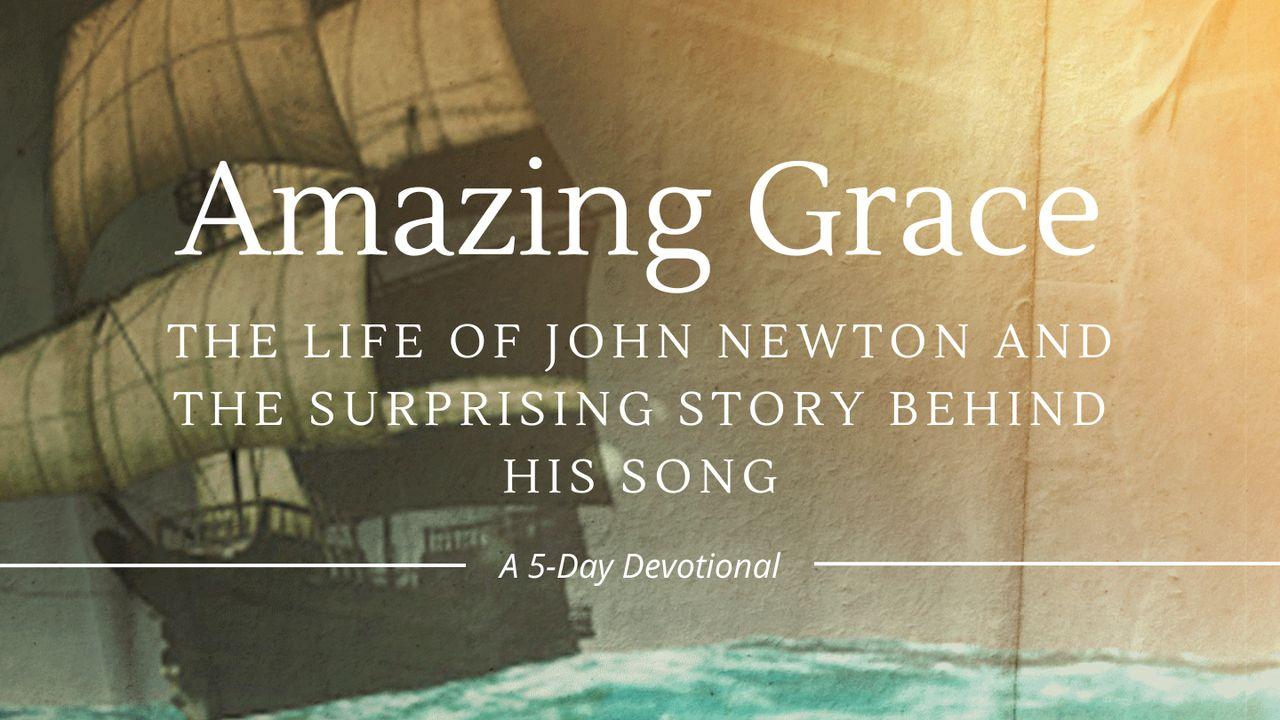Amazing Grace: The Life of John Newton and the Surprising Story Behind His SongExemplo

Self-Deception
John returned to sea as first mate on a slave ship, the Brownlow, under Captain Jackson. His newly rooted faith in Christ had changed him, and he desired to keep himself pure, create a livelihood that would allow him to marry his first love, Mary, and serve her as Christ serves the church. Like most Europeans, he did not yet understand the slave trade as incompatible with his faith.
Under Jackson, John had the task of trading for slaves whenever the Brownlow dropped anchor. John took no pleasure in his work. John was responsible for the safety of his crew, yet his crew was dying—some from accidents, and some at the hands of fever. The condition of the slaves was worse under the brutality of Captain Jackson. He would make the slaves watch as he fed the dead to the sharks as a warning to not seek death as a way of escape.
John had vowed that he would live as a strong Christian, praying multiple times a day, refraining from all vices, and refusing even a moment of idleness. He lasted one day. Maybe two. By the time the Guinea coast came into view, his Bible was buried deep in his sea chest and his plans for spiritual discipline were little more than a hazy memory.
He berated himself at first. He tried to summon the strength to recover his virtues. But, his armor was gone, his defenses overrun. Vices won out. He began to wish that he had sunk to the ocean floor when he had first cried out to God. Better to die calling for mercy than live mired in sin. He could make no more grand resolutions. All he could do was surrender.
Something was different within him. While his voyage on the Greyhound had marked a turning point in his life, even more significant was the moment when John finally realized he needed God to do for him what he could not do for himself. He was a wretch, and he needed grace.
John lived simply and quietly for the rest of his time on the ship, and he was relieved when they left Africa, knowing he would be home within months. He thought that with the profits he made from the trade and with a command of his own, he would finally wed Mary and his life would begin.
John was convinced that his time as a captain in the slave trade was a God-given gift that would allow him solitude to read, write, and pray, attending to his own spiritual growth. Yet as soon as they arrived on the Guinea coast, John’s leadership skills were tested. Discipline was difficult and insurrection was always lurking. The trade was slow and business was looking far worse than it ever had. The slave trade was not going to make him rich and provide for himself and his new wife Mary.
His final voyage ended with the sale of the slaves, and no loss of life, or disaster. John credited the prayers and blessings of the people as instrumental in the success of the voyage. John eventually saw the inhumanity of his work. It would take time, but he would come to realize how deeply self-deceived he had been during these years. It was a relief to him when he left the slave trade. God would ultimately provide him with a more humane calling as a preacher of the grace Christ gives. Finally, he found freedom.
It is painful to contemplate the way Newton could be blind—even after his initial conversion—to his participation in race-based chattel slavery and the brutality of the forced migration of enslaved people in the most inhumane and cruel conditions. He did this while simultaneously taking the first steps to place his personal faith in Christ. This blood was on his hands, and it took years before he became aware of how self-deceived he was. It would be naïve to think this couldn’t happen to us. It is a work of God’s grace to show us the truth, until we can say, “I once was blind, but now I see.” Like Newton, it is our hope that “grace will lead me home.”
Respond
How often have you tried, on your own power, to live a righteous and pure life? What was the result?
What misconceptions or self-deceptions do you need to confront in your life in order to be at home in God’s grace?
How would you describe your journey of faith from self-deception to full surrender to Christ? Where are you on this path?
Prayer
Thank you, Lord, that you keep calling me home through your grace. Faith is a journey of discovery of the truth of Christ’s sacrifice on the cross. Help me shed any self-deceptions that keep me from seeing clearly that it is only through you that I can live a godly life, and not on my own power. Give me your strength to stand against those things that pull me away from you and oppress the lives of others. Amen.
Escritura
Sobre este plano

This reading plan includes five daily devotions based on Bruce Hindmarsh’s and Craig Borlase’s book Amazing Grace: The Life of John Newton and the Surprising Story Behind His Song. This study will explore John Newton’s experiences with shame, forgiveness, self-deception, grace, and courage and how each of these were part of his story of redemption through Christ. As you learn from his experiences, may you also see your story in light of God’s grace and respond with courage and grace toward yourself and others.
More





